Computational Biochemistry
What is Computational Biochemistry?
Computational Biochemistry research develops and utilizes mathematical models, computer simulations, and statistical tools to address big questions in biology. This field is especially important in the 21st century as the volume and quality of large datasets has advanced more rapidly than our ability to analyze them.
What is the impact of our research in Computational Biochemistry?
- Pathogenic drug resistance can be predicted by computational algorithms, allowing scientists to avoid developing compounds that are more likely to lead to resistance. Find out more here.
- New drugs for various diseases can be designed by studying computer models of protein-compound interactions. Find out more here.
- The way genome sequence impacts human health is being elucidated in part by scientists in our department developing new analytical pipelines to interpret large datasets. Find out more here.
Who's studying Computational Biochemistry?
-

Daniel Bolon , PhD
Professor of Biochemistry & Molecular BiotechnologyType: Primary
Areas of Research: Biochemical Mechanisms, Cellular Biochemistry, Computational Biochemistry
Category: CLIM/Ldb cofactors,disease preventionResearch Interest: The Bolon Lab investigates relationships between protein sequence, structure and function.
Broader Impact: COVID-19, cancer, HIVOffice Location: LRB 922
Lab Location: LRB 960 E-D
Phone: 508-856-3588
Lab Page -

Julia Flynn , PhD
Assistant Professor of Biochemistry & Molecular Biotechnology; Member of the Bolon Lab.Type: Primary
Areas of Research: Biochemical Mechanisms, Cellular Biochemistry, Computational Biochemistry
Research Interest: Dr. Flynn investigates how changes in DNA sequence impact protein function.
Key Words: drug resistance, protein adaptation, protein folding, evolution, mutagenesis, deep mutational scanning
Research Tools: S. cerevisiae (yeast)
Broader Impact: cancer, SARS-CoV2 -
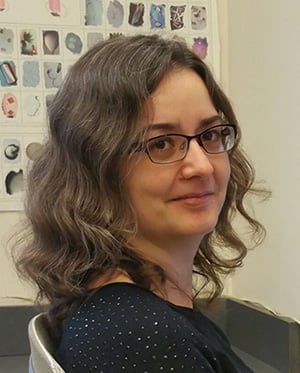
Nese Kurt Yilmaz , PhD
Associate Professor of Biochemistry & Molecular BiotechnologyType: Primary
Areas of Research: Biochemical Mechanisms, Biophysics & Macromolecular Structures, Computational Biochemistry
Research Interest: Biological function, enzyme inhibition and drug resistance.
Key Words: protein structure, biomolecular complexes, conformational dynamics, enzyme inhibition
Research Tools: viral proteases, deaminases, renalase
Broader Impact: Viral infections (HIV-1, HCV, coronaviruses, influence, dengue), cancer, type I diabetesOffice Location: LRB 919
Phone: 508-856-1867
Lab Page -

Francesca Massi , PhD
Associate Professor of Biochemistry & Molecular BiotechnologyType: Primary
Areas of Research: Biochemical Mechanisms, Biophysics & Macromolecular Structures, Computational Biochemistry
Research Interest: The Massi lab uses their expertise in NMR Spectroscopy to understand the dynamics of protein-RNA interactions.
Office Location: LRB 925
Lab Location: LRB 960 B, 970 N
Phone: 508-856-4501
Lab Page -

Oliver J. Rando , MD, PhD
Endowed Chair in Biochemistry and Molecular Biotechnology I; Professor of Biochemistry & Molecular BiotechnologyType: Primary
Areas of Research: Cellular Biochemistry, Computational Biochemistry, Gene Expression & Epigenetics
Research Interest: The Rando Lab studies the role of epigenetic inheritance in programming health and disease.
Key Words: epigenetics, chromatin, small non-coding RNA, embryology, spermatogenesis
Research Tools: S. cerevisiae (yeast), M. musculus (mouse), C. elegans (nematode worm)
Broader Impact: Paternal environments can affect diabetes, metabolic syndrome, anxiety, schizophrenia and more.he/him/his
Office Location: LRB 906
Lab Location: LRB 940 A-C &
LRB 970 X-Y
Phone: 508-856-8879
Lab Page -
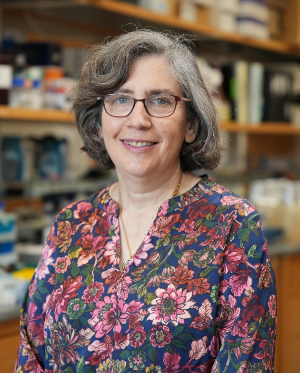
Celia Schiffer , PhD
Chair & Arthur F. and Helen P. Koskinas Professor of Biochemistry and Molecular Biotechnology, and Director of the Institute for Drug ResistanceType: Primary
Areas of Research: Biophysics & Macromolecular Structures, Chemical Biology, Computational Biochemistry
Research Interest: The Schiffer Lab studies the molecular basis for drug resistance and has developed a new paradigm for avoiding drug resistance when targeting enzymes in structure-based drug design.
Research Tools: protein crystallography, CryoEM/CryoET, molecular dynamics simulations, homology modeling, enzymatic assays and medicinal chemistry,
Broader Impact: RNA Viruses (HIV, HTLV, Influenza, Coronaviruses, Enteroviruses, Flaviviruses) and CancerOffice Location: LRB 928
Lab Location: LRB 840 D; 860 C; 960 E; 970 C, D, L, M
Phone: 508-856-8008
Lab Page -
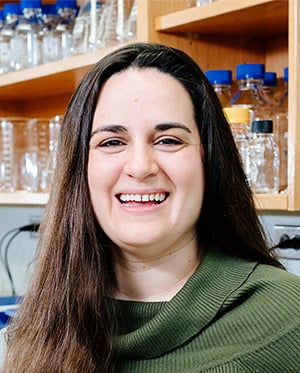
Summer Thyme , PhD
Associate Professor of Biochemistry & Molecular BiotechnologyType: Primary
Areas of Research: Cellular Biochemistry, Computational Biochemistry, Gene Expression & Epigenetics
Research Interest: The Thyme Lab studies neurodevelopmental disorders using zebrafish.
Key Words: zebrafish, neurodevelopmental disorder, intellectual disability, Down syndrome, drug discovery, computation, genomics, mRNA, scRNA-seq, genome-editing, CRISPR, protein engineering
Research Tools: zebrafish, CRISPR
Broader Impact: developing treatments for intellectual disability in neurodevelopmental disorders.Office Location: LRB 803
Lab Location: LRB 870 R/S/T
Phone: 508-856-3251
Lab Page -

Chen Xu , PhD
Professor of Biochemistry & Molecular Biotechnology; Director of the Cryo-Electron Microscopy Core FacilityType: Primary
Areas of Research: Biophysics & Macromolecular Structures, Computational Biochemistry
Research Interest: The Xu lab is constantly researching ways to increase accessibility of Cryo-EM techniques.
Key Words: Cryo-electron Microscopy, Structural Biology
Research Tools: Cryo-Electron MicroscopyOffice Location: LRB 902 &
SA-106
Lab Location: SA-106
Phone: 774-455-4050
Lab Page
x
x
Relevant Blog Posts
-
 May 6, 2024Read more
May 6, 2024Read more -
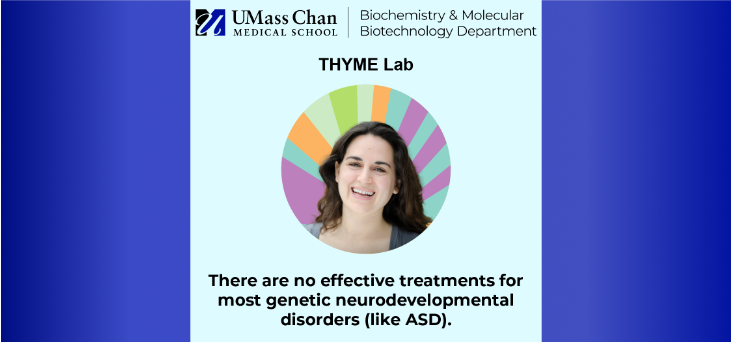 Apr 1, 2024
Apr 1, 2024Autism Awareness Day - Featuring the Thyme Lab
Read more -
 Jan 10, 2025
Jan 10, 2025New NMR machine to initiate New England NMR Consortium
Read more -
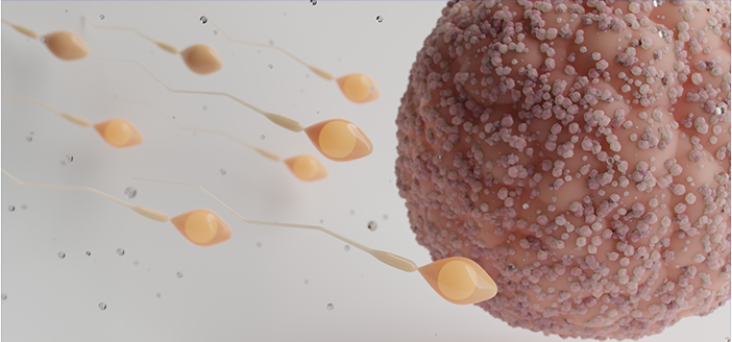 Apr 27, 2023
Apr 27, 2023Donor Conception Awareness Day
Read more -
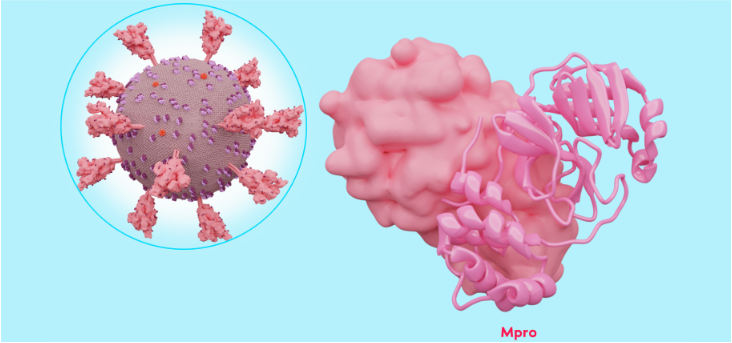 Feb 14, 2023
Feb 14, 2023Coming up with new ways to treat COVID-19 is at the *heart* of BMB.
Read more
Molecular illustrations on this webpage were generated by Leonora Martínez-Núñez, PhD.
